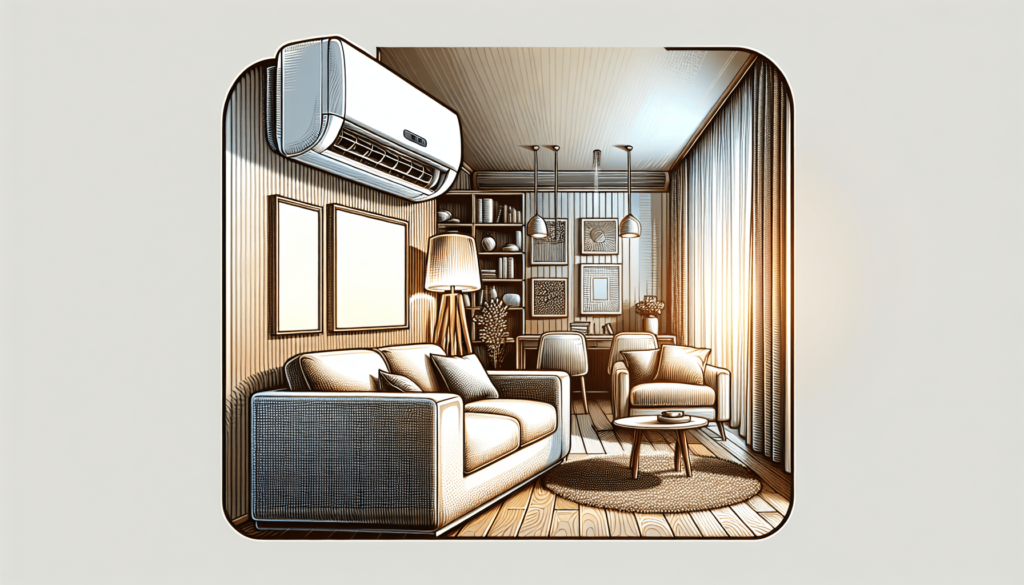Looking for the perfect mini split AC for your rental property? Look no further! With the right choice, you can provide your tenants with optimal comfort while also maximizing energy efficiency. In this article, we will explore some key factors to consider when selecting a mini split AC for your rental property, ensuring that you make the best decision for both your tenants and your bottom line. So let’s dive right in and find the perfect fit for your rental property!
Factors to Consider
When choosing the right mini split AC for your rental property, there are several important factors that you should consider. These factors will have a significant impact on the comfort of your tenants, as well as on your property’s energy efficiency and overall cost. By carefully evaluating these factors, you can make an informed decision that meets the needs of your rental property and its occupants.
Size of the Rental Property
The size of your rental property is an essential factor to consider when choosing a mini split AC system. A system that is too small may struggle to adequately cool or heat the space, while an oversized system can lead to energy wastage and increased operating costs. Therefore, it is crucial to determine the appropriate BTU (British Thermal Units) requirement for your property.
Climate
The climate in which your rental property is located plays a significant role in selecting the right mini split AC system. Different climate zones have varying temperature ranges and humidity levels that can impact the performance and efficiency of the unit. It is essential to consider whether your property is in a hot and humid climate, a cold climate, or a moderate climate.
Energy Efficiency
Energy efficiency is a crucial factor to consider when selecting a mini split AC system. A more efficient system will not only reduce your property’s energy consumption but also lower your utility bills. Several key features contribute to the overall energy efficiency of a system, including the SEER rating, inverter technology, and ENERGY STAR certification.
Installation Requirements
Understanding the installation requirements is essential to ensure that your mini split AC system can be properly installed in your rental property. You will need to decide between ductless or ducted installation, determine the appropriate placement for the indoor and outdoor units, and ensure that the necessary electrical and refrigerant requirements are met.
Noise Level
The noise level produced by the mini split AC system can significantly impact the comfort of your tenants. It is essential to consider the indoor and outdoor noise levels of the system. Some units have advanced noise reduction technology, such as insulated compressors and sound-dampening materials, which can help minimize noise levels and create a more peaceful living environment.
Warranty and Support
Selecting a mini split AC system that comes with a comprehensive warranty and reliable customer support is crucial. A manufacturer warranty provides peace of mind and protects you from unexpected repair costs. Additionally, consider the availability of spare parts to ensure that you can easily and quickly obtain replacements if needed.
Cost
The cost of the mini split AC system is undoubtedly an important consideration. Assess both the upfront cost of purchasing and installing the unit, as well as the operating cost over time. It is important to evaluate the overall value for money that the system offers, considering factors such as energy efficiency, warranty, and support, in addition to the initial cost.
Size of the Rental Property
Determining the BTU Requirement
Determining the appropriate BTU requirement for your rental property is crucial in selecting the right mini split AC system. BTU is a measure of the cooling or heating capacity of an air conditioner. It is essential to consider factors such as the square footage of the space, the number of rooms, ceiling height, and the number of occupants. A professional HVAC technician can help calculate the BTU requirement accurately.
Single Zone vs. Multi-Zone
Once you have determined the BTU requirement, you will need to decide between a single-zone or multi-zone mini split AC system. A single-zone system consists of one outdoor unit and one indoor unit, making it suitable for cooling or heating a single room or small area. On the other hand, a multi-zone system can connect multiple indoor units to a single outdoor unit, providing individual temperature control for different zones or rooms within your rental property.

Climate
Hot and Humid Climate
If your rental property is located in a hot and humid climate, it is crucial to choose a mini split AC system that can effectively manage high humidity levels. Look for features such as a dehumidification mode or a humidity control function. These features help remove excess moisture from the air, ensuring a comfortable living environment for your tenants.
Cold Climate
In a cold climate, it is important to select a mini split AC system that can efficiently heat your rental property. Look for a system that offers a high heating capacity and can operate effectively even in extremely low temperatures. Some models are specifically designed for cold climates and incorporate features such as anti-freezing protection to ensure reliable operation.
Moderate Climate
In a moderate climate, you have more flexibility in choosing a mini split AC system. A system with a balanced cooling and heating capacity will provide optimal comfort year-round. Consider features such as a programmable thermostat that allows you to set temperature schedules and adjust settings based on the changing weather conditions.
Energy Efficiency
SEER Rating
SEER (Seasonal Energy Efficiency Ratio) rating is an important metric to consider when evaluating the energy efficiency of a mini split AC system. The higher the SEER rating, the more energy-efficient the system is. Look for systems with a high SEER rating to ensure that you are investing in a unit that will help reduce your energy consumption and lower your utility bills.
Inverter Technology
Inverter technology is another important feature that contributes to energy efficiency. Inverter-driven compressors adjust the speed and cooling/heating capacity of the system according to the desired temperature, rather than continuously running at full power. This results in more precise temperature control, reduced energy wastage, and improved overall efficiency.
ENERGY STAR Certification
Choosing an ENERGY STAR certified mini split AC system ensures that you are selecting a unit that meets strict energy efficiency guidelines set by the Environmental Protection Agency (EPA). ENERGY STAR certified units are up to 30% more efficient than standard models, helping you save on energy costs while reducing your carbon footprint.

Installation Requirements
Ductless vs. Ducted
One key decision to make when installing a mini split AC system is whether to opt for a ductless or ducted installation. Ductless systems are more common in rental properties as they are easier and more cost-effective to install. Ducted systems require the installation of ductwork throughout the property, which can be more disruptive, time-consuming, and expensive.
Indoor and Outdoor Unit Placement
The placement of the indoor and outdoor units is an important consideration during installation. Indoors, the units should be mounted in a location that provides even distribution of air throughout the room without blocking access or obstructing furniture placement. Outdoors, the unit should be installed in a well-ventilated area away from any obstacles or obstructions.
Electrical and Refrigerant Requirements
Understanding the electrical and refrigerant requirements of your mini split AC system is crucial to ensure that your property can support the installation. It is essential to ensure that your electrical system can handle the power requirements of the unit and to follow local electrical codes. Additionally, ensure that you have access to refrigerant if your system requires maintenance or repairs in the future.
Noise Level
Indoor Noise
The noise level produced by the indoor unit of a mini split AC system can impact the comfort of your tenants, especially if the system is installed in bedrooms or living spaces. Look for units with advanced noise reduction technology, such as insulated compressors or sound-dampening materials. Additionally, consider low-noise mode options that allow for quieter operation during certain times of the day or night.
Outdoor Noise
The noise level produced by the outdoor unit of a mini split AC system can also impact the peace and tranquility of your rental property. Choose a system that has noise reduction features, such as a quiet mode or an insulated compressor. Proper placement of the outdoor unit can also help minimize noise impact, such as locating it away from windows, balconies, or common areas.
Warranty and Support
Manufacturer Warranty
A comprehensive manufacturer warranty is essential when investing in a mini split AC system. The warranty coverage should include both parts and labor, with longer coverage periods being preferable. It is important to carefully read and understand the warranty terms and conditions to ensure that you are adequately protected against any potential defects or issues with the system.
Availability of Spare Parts
Consider the availability of spare parts for the mini split AC system you are considering. It is essential that spare parts are readily available, especially for older or discontinued models. This ensures that you can easily and quickly obtain the necessary replacements in case of any repairs or maintenance requirements.
Customer Support
Reliable customer support from the manufacturer or supplier is crucial to address any inquiries or issues that may arise during the lifetime of the mini split AC system. Consider the reputation and responsiveness of the company’s customer support team. Prompt and efficient customer support can make a significant difference in resolving any concerns or technical difficulties.
Cost
Upfront Cost
The upfront cost of purchasing and installing a mini split AC system can vary depending on the brand, model, and features. Consider your budget and weigh the cost against the benefits and features that the system offers. Remember to consider the long-term savings that an energy-efficient system can provide through reduced energy consumption and lower utility bills.
Operating Cost
In addition to the upfront cost, it is important to evaluate the operating cost of the mini split AC system. Look for systems with high energy efficiency ratings, as they will consume less energy and result in lower operating costs over time. Consider models with energy-saving features such as programmable timers or sleep modes, which help optimize energy usage.
Value for Money
When evaluating the cost of a mini split AC system, it is crucial to consider the overall value for money. This includes assessing factors such as energy efficiency, warranty and support, noise levels, and additional features. A system that offers a good balance between cost and benefits, and meets the specific needs of your rental property, provides the best value for your investment.
Additional Features
Remote Control
Many mini split AC systems come with a remote control, allowing tenants to easily adjust the temperature settings without having to physically access the indoor unit. Remote controls can provide convenience and flexibility, enabling tenants to control the comfort of their living spaces with ease.
Wi-Fi Connectivity
Some advanced mini split AC systems offer Wi-Fi connectivity, allowing tenants to control the unit using their smartphones or other connected devices. Wi-Fi connectivity provides the convenience of remote control from anywhere within the rental property and even when tenants are away. It allows for greater customization and scheduling options, enhancing overall comfort and energy efficiency.
Air Purification
Some mini split AC systems feature built-in air purification technology, such as filters or ionizers, that help remove allergens, dust, and odors from the air. This is especially beneficial for tenants with allergies or respiratory conditions, as it improves indoor air quality and promotes a healthier living environment.
Heat Pump Capability
Heat pump capability is an additional feature to consider, especially if your rental property experiences colder temperatures during winter months. A mini split AC system with heat pump capability can provide both cooling and heating functions, eliminating the need for separate heating systems. This can offer cost savings and versatility in maintaining comfortable temperatures throughout the year.
Conclusion
Choosing the right mini split AC system for your rental property involves careful consideration of several factors. The size of the property, climate, energy efficiency, installation requirements, noise level, warranty and support, cost, and additional features all play an important role in making an informed decision. By considering these factors and finding a balance between cost and benefits, you can select a mini split AC system that meets the unique needs of your rental property and ensures the comfort and satisfaction of your tenants.

